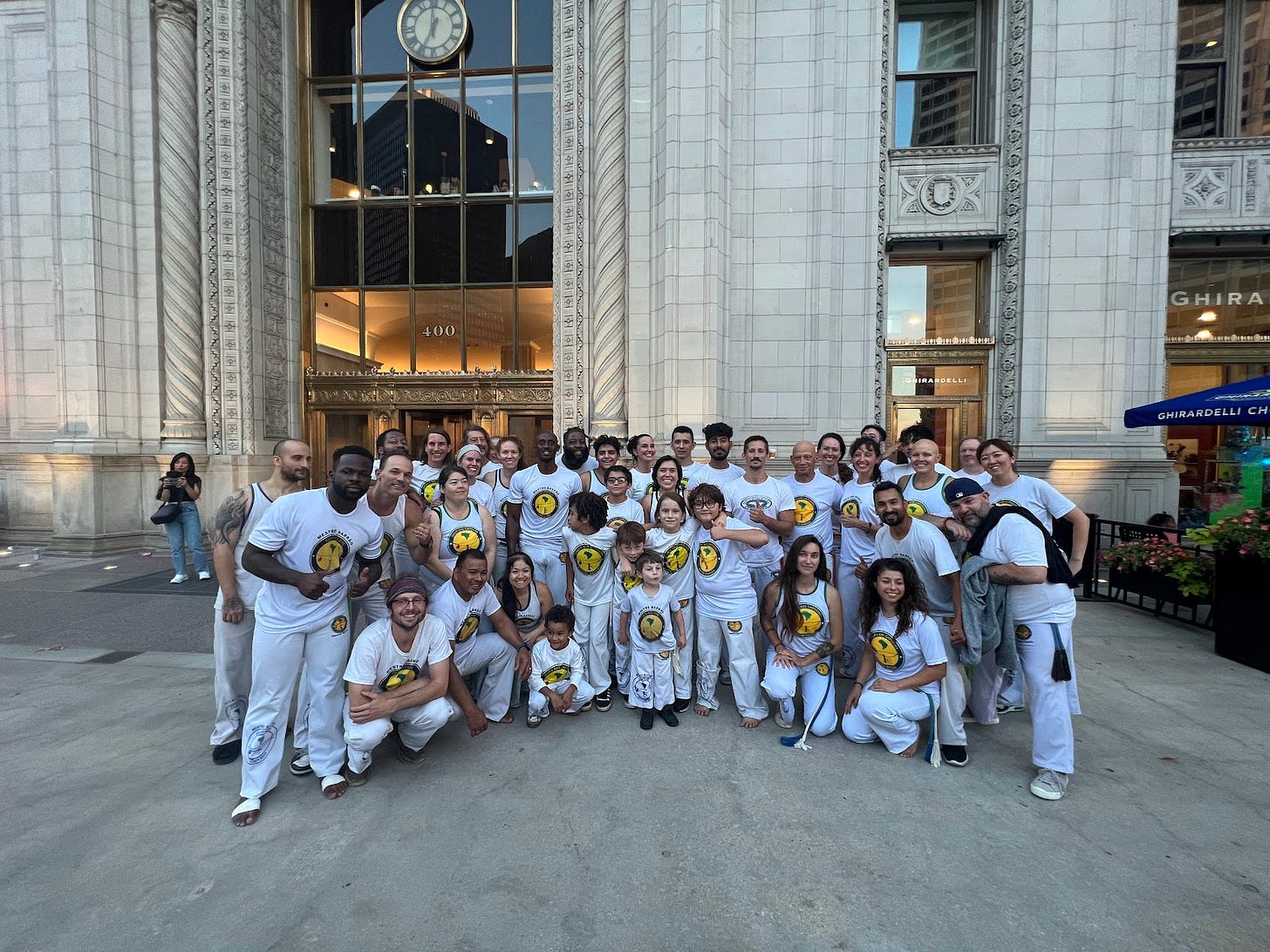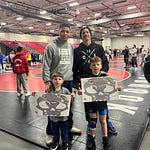🔥Welcome to Volume #00109!🔥
I’m Christian Champ. This is ☯️The Middle Way Newsletter ☯️. It is a place where I write, explore, share, and invite you along for the journey.
If you enjoy the newsletter, please share it with your friends.
🎂Why We Need to Do the Simple Things First🎂
My head spun as my Apple watch buzzed.
Light crept in from the curtains.
I felt so disoriented that I forgot I hit snooze two times already.
Was it morning already?
I tossed and turned the night before, feeling the anxiety rising as I failed to fall asleep.
A month ago, I realized my sleep fell off. Grinding on my computer later and later led to a cascading effect of worse and worse sleep. It was as if each additional minute of screen time ate into hours of sleep.
When I reflected, I noticed that rest came quickly when I didn’t touch screens after 930 p.m. and when I was in bed by 10 p.m.
When I chose to stop with the screens and lie down by 10 p.m., my sleep became glorious.
Then Wednesday night rolled around, and I whiffed. I stayed on the laptop, punching keys and blowing through my stop signs. I missed my bedtime by an hour.
My sleep again resembled trash.
Instead of learning a lesson and remembering what transpired, I repeated the same mistake the following night.
I feel down at doing the simple things.
The net result is waking up feeling like I slept in a mosh pit during a Rage Against the Machine show. The rest of the day, I felt sluggish. My work suffered. My workout suffered. My relationship suffered. My reaction times and thinking suffered.
All I needed to do was the simple thing.
How many of life’s outcomes improve immensely by doing simple things?
It’s an easy way to create Pareto Law-like outcomes.
If we want to be healthy, we sleep right, eat whole foods and move.
If we want to be good parents, we listen, relate, and put the damn phones down.
If we want to be good leaders, we listen, empathize, make people better, and help our teams and colleagues win.
If we want to be active, we set windows where we take walks and work out.
If we want to learn something, we hive off time to singularly focus on the task at hand and practice it. We put down the damn phones and put away our emails.
If we want a more meaningful life and to make a difference, we find things to dedicate our time to and help others.
If we want to save money, we create a budget and automate an amount that gets saved every month.
All of these things don’t take a ton of effort. They are simple but not easy. When we repeat them repeatedly, they become simple and easy.
What is stopping us from doing the simple things right now?
🧠Things to Think About🧠
The Importance of Staring Directly at the Sun by Experimental History
Adam breaks down the things we think we know, like how a toilet works and how we find out new things. We tend to find out the non-obvious things but forget that we don’t actually know the obvious things, like how a toilet works.
Here's one of my favorite psychology studies of all time. You bring people into the lab, and you ask them, “Do you know how a toilet works?” And they say “Uhh yes, I'm not an idiot.” And then you go “Okay, could you please write down, step by step, how a toilet works.” And then you ask them to explain something that requires knowledge of toilets, like “How does pressing the lever on the side of the toilet cause the bowl to empty and then refill again to a certain level?”
What participants learn in this study is that, to their horror, they don't really know how a toilet works, at least not nearly as well as they thought they did. This isn't specific to toilets—you can get it with everything from spray bottles to helicopters.
My 4-year-old son constantly asks me, “How do you know”. This question oftentimes triggers alarm bells that I don’t actually know. Adam reminds us that we need to practice reminding ourselves that we don’t know to help overcome our illusions of explanatory depth.
It's hard to overcome your illusions of explanatory depth, just like it's hard to hold your breath for a long time—our urge to make sense of things and our urge to breathe are both there for good reason, and our brains don't trust us to turn those urges off at will. It takes practice.
Seth Godin on Fooling Ourselves
If we need to fool ourselves constantly, we might have a problem.
Marketing to others begins with marketing to ourselves.
If it turns out that our self-deception is a reliable source of fuel for us to achieve our goals, it might be worth living with. But at some point, our ability to fool ourselves becomes toxic. It blocks our ability to create generous and useful work, and it eats away at our confidence and peace of mind.
It’s not easy to see ourselves as others do. But perhaps they’re onto something.
Nick Harkaway on “Moving Smart and Make Things”
Nick, a great fantasy writer, wrestles with AI and art in this piece. Art does stand on the shoulders of others, but ultimately, he doesn’t think training LLMs is art.
Milton, Virgil and TS Eliot were frantic referencers and appropriators, and we not only don’t argue with it, we teach in schools how brilliant they were. I’m always amazed (and touched) when people write to me to ask to use quotes from my work which are well within fair use. Or, honestly, sometimes when they want to go a bit beyond it. And I also tend to think that for humans and art, fair use could be extended. So, in sum… I’m pretty relaxed about that kind of thing, even if I do feel an irrational territorial twinge when I see it in action (and I do think that writing into someone else’s creative universe is a weighty thing - about which, more another time). Yes, by all means: drop me a line and ask with confidence. But just as you would recognise from that jumbled paragraph that I might be less comfortable with a proposal that you just dump the entire text of my book into your for-profit MMORPG, so with LLMs.
🎧Things to Listen, See, and Watch 🎧
The holes in our experience make our art unique
Children are born artists and creative. They are psychedelics, and letting them go and not corrupting them is key. Being around kids gives us a second juice and shows us the way
Kids have fresh eyes, take things literally, and show us things to see.
The best artist takes simple things and makes us look at them like they are alien (the same as kids do)
Find the hole that your work can fill
Beth Pickens: “When you feel bad when you don’t practice for a couple of days, realize you are a creative person.”
Artists have to dedicate themselves to the practice with devotion
Mary Carr: “Try praying for 30 straight days and see what happens”
You create the ritual and sit down to do it, but it might take many days for it to happen
We need to put constraints on our work but be constantly evolving (parent or artist) as people and in our constraints
You get successful by doing something people weren’t looking for, which is hard to replicate
👆Great Watch
💣Words of Wisdom💣
"Listening is the most powerful weapon after self-belief and persistence you can bring into play as an entrepreneur." (Felix Dennis, How to Get Rich)
"Human beings (domesticated primates) are symbol-using creatures, which means, as the pioneer semanticist, Korzybski, noted, that those who rule symbols rule us." (Robert Anton Wilson, Prometheus Rising)
"We are the stories we tell ourselves." (Eliot Peper, Bandwidth)
"The creative journey is not one in which you’re crowned the triumphant hero and live happily ever after. The real creative journey is one in which you wake up every day, like Phil, with more work to do." (Austin Kleon, Keep Going)
"Without giving up hope—that there’s somewhere better to be, that there’s someone better to be—we will never relax with where we are or who we are." (Pema Chödrön, When Things Fall Apart)
"To build strong children, reinforce their sense of belonging to a family by articulating exactly what is distinctive about your family. They should be able to say with pride, “Our family does X.” - Kevin Kelly
"The lesson: even the most high-achieving, self-aware professionals need help sorting out their responses and learning how to practice." (Sally Jenkins, The Right Call)
"Coaches need to accept that in a complex system, they cannot possibly know what the optimal movement solution for an individual athlete will be. They can only help them find it for themselves." (Rob Gray, How We Learn to Move)
"If it were easy, everyone would do it. If everyone did it, how valuable would it be? The whole point is that it's hard. The risk is a feature, not a bug. Nec aspera terrent. Don't be frightened by difficulties." (Ryan Holiday, Courage Is Calling)
"Uncertain Discomfort + Wonder > Certain Discomfort In thoughts about the future, worry is traded for wonder." (Paul Millerd, The Pathless Path)
"In its anxious pursuit of objectivity, science must not forget that our experience of the world comes from within. Every glance that we cast toward the world is made from a particular perspective." (Carlo Rovelli, The Order of Time)
"We no longer look to ourselves for guidance on even the most personal aspects of our lives. Instead, we turn to experts and the internet for advice, instruction, evaluation, and confirmation." (Carol Sanford, No More Gold Stars)
"First, always ask for what you want. Works in relationships, business, life." (Kevin Kelly, Excellent Advice for Living)
🙏Thanks for Reading🙏
When do you need to do the simple things first?
Namaste,
Christian

















